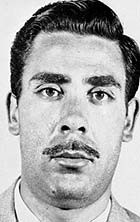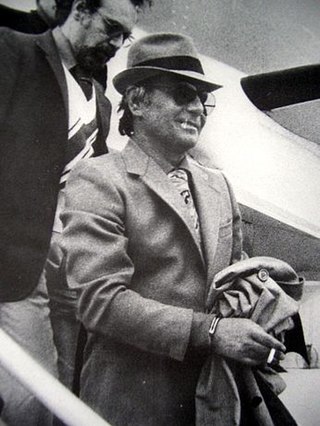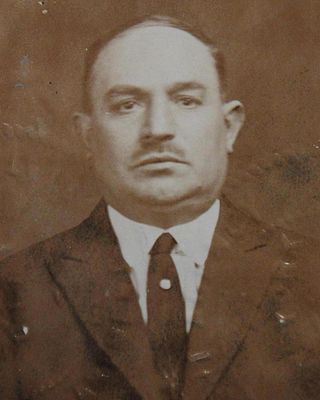Contents
This article needs additional citations for verification .(February 2022) |
| |||
|---|---|---|---|
| +... |
This article needs additional citations for verification .(February 2022) |
| |||
|---|---|---|---|
| +... |
• June 21 - Demetrius "Big Meech" Flenory Sr, founder of The Black Mafia Family

Joseph Charles Bonanno, sometimes referred to as Joe Bananas, was an Italian-American crime boss of the Bonanno crime family, which he ran from 1931 to 1968.

Tommaso Buscetta was a high ranking Italian mobster and a member of the Sicilian Mafia. He became one of the first of its members to turn informant and explain the inner workings of the organization.

Salvatore Achille Ettore Lima, often referred to as Salvo Lima, was an Italian politician from Sicily who was associated with, and murdered by, the Sicilian Mafia. According to the pentito Tommaso Buscetta, Lima's father, Vincenzo Lima, was a member of the Mafia but is not known whether Lima himself was a made member of Cosa Nostra. In the final report of the first Antimafia Commission (1963–1976), Lima was described as one of the pillars of Mafia power in Palermo.

Joseph Magliocco, also known as "Joe Malayak" and "Joe Evil Eye", was a Sicilian-born New York mobster and the boss of the Profaci crime family from 1962 to 1963. In 1963, Magliocco participated in an audacious attempt with Joseph Bonnano to kill other family bosses and take over the Mafia Commission. The attempt failed, and, while his life was spared, he was forced into retirement. Soon after, he died of a heart attack on December 28, 1963.
Salvatore "Ciaschiteddu" Greco was a powerful mafioso and boss of the Sicilian Mafia in Ciaculli, an outlying suburb of Palermo famous for its citrus fruit groves, where he was born. His nickname, "Ciaschiteddu" or "Cicchiteddu", translates from the Sicilian alternatively as "little bird" or as "little wine jug".

Angelo La Barbera was a powerful member of the Sicilian Mafia. Together with his brother Salvatore La Barbera he ruled the Mafia family of Palermo Centro. Salvatore La Barbera sat on the first Sicilian Mafia Commission that was set up in 1958 as the capo mandamento for Mafia families of Borgo Vecchio, Porta Nuova and Palermo Centro.

Michele Cavataio, also known as Il cobra was an Italian mobster and powerful member of the Sicilian Mafia. He was the boss of the Acquasanta mandamento in Palermo and was a member of the first Sicilian Mafia Commission. Some sources spell his surname as Cavatajo.
The 1960s Sicilian Mafia trials took place at the end of that decade in response to a rise in organized crime violence around the late 1950s and early 1960s. There were three major trials, each featuring multiple defendants, that saw hundreds of alleged Mafiosi on trial for dozens of crimes. From the authority's point of view, they were a failure; very few defendants were convicted, although later trials as well as information from pentiti confirmed most of those acquitted were Mafiosi members, and were guilty of many crimes including some of those they were acquitted of.
A series of meetings between Sicilian Mafia and American Mafia members were allegedly held at the Grand Hotel et des Palmes in Palermo, Sicily, between October 12–16, 1957. Also called the 1957 Palermo Mafia summit, the summit discussed the international illegal heroin trade in the French Connection. The FBI believed it was this meeting that established the Bonanno crime family in the heroin trade.
The Commission is the governing body of the American Mafia, formed in 1931 by Charles "Lucky" Luciano following the Castellammarese War. The Commission replaced the title of capo di tutti i capi, held by Salvatore Maranzano before his murder, with a ruling committee that consists of the bosses of the Five Families of New York City, as well as the bosses of the Chicago Outfit and, at various times, the leaders of smaller families, such as Buffalo, Philadelphia, Detroit, and others. The purpose of the Commission was to oversee all Mafia activities in the United States and serve to mediate conflicts among families.

The Greco Mafia family is historically one of the most influential Mafia clans in Sicily, from the late 19th century. The extended family ruled both in Ciaculli and Croceverde Giardini, two south-eastern outskirts of Palermo in the citrus growing area. Members of the family were important figures in the Sicilian Cosa Nostra. Salvatore "Ciaschiteddu" Greco was the first ‘secretary’ of the Sicilian Mafia Commission, while Michele Greco, also known as The Pope, was one of his successors.
Nicholas Angelo "Nicky Mouth" Santora was the reputed underboss of the Bonanno crime family.
Paul Sciacca was a New York City mobster who succeeded Joseph Bonanno as boss of the Bonanno crime family in 1968. He was succeeded by Natale Evola in 1971.
The Bonanno crime family is an Italian-American Mafia crime family and one of the "Five Families" that dominate organized crime activities in New York City as part of the criminal phenomenon known as the American Mafia.

Nicolo "Cola" Schiro was an early Sicilian-born New York City mobster who, in 1912, became the boss of what later become known as the Bonanno crime family.
This is a list of organized crime in the 1900s, arranged chronologically.
This is a list of organized crime in the 1950s, arranged chronologically.